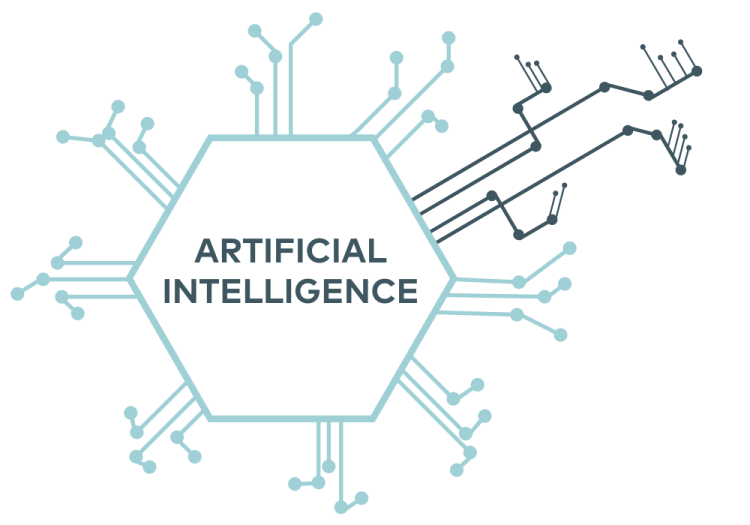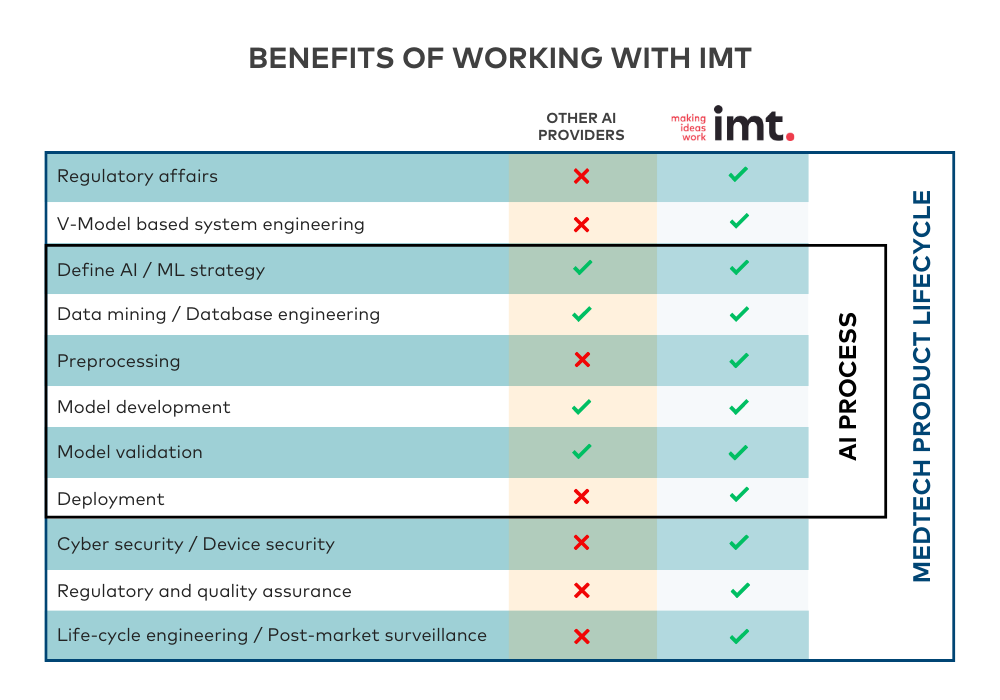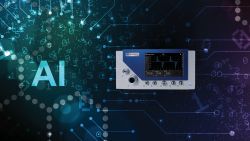
The integration of Artificial Intelligence (AI) in embedded devices is revolutionizing industries, particularly medical technology. AI can empower these devices to learn, adapt, and respond in real-time, providing higher accuracy and predictability. This results in improved efficiency, performance, serviceability and user experience, making AI a crucial component in today's technology landscape.

Our team of expert engineers specializes in artificial intelligence (AI) on embedded devices, delivering cutting-edge solutions tailored specifically for innovative systems. Our systematic approach begins with evaluating your specific requirements, followed by data mining and preprocessing to ensure high-quality and reliable insights. We optimize machine learning models for enhanced performance and rigorously validate them to meet the highest standards. Our seamless deployment includes code generation and coefficient quantization for efficient implementation. At IMT, we are passionate about transforming your business with AI on embedded devices.
Engineering of AI on embedded systems
We offer a full range of services to deploy AI on embedded systems, including:
- Design and training of AI algorithms (especially neural networks)
- Classification, regression, clustering, and reinforcement learning
- Implementing predictive analytics
- Classical and AI-assisted image processing/recognition
- Application of AI for industrial and medical devices
- Optimization of workflows through AI automation
Systematic AI process
-
Strategy: Define problem problem-solving approach
At IMT, we employ a systematic AI process for embedded systems. Our strategy involves evaluating AI techniques and selecting the most suitable model, considering factors like pre-trained versus proprietary models, supervised versus unsupervised learning, and offline versus online training. We also define data requirements and formats and identify potential bias sources while setting clear goals and performance criteria. -
Data Mining: Unleashing the Power of Data:
Data plays a central role in machine learning (ML). Our advanced data mining techniques uncover valuable insights from your datasets, enabling accurate predictions and optimal performance in your embedded systems. -
Preprocessing: Enhancing data quality
We ensure the reliability of your embedded system's AI model by removing noise and outliers from the dataset. Our preprocessing techniques eliminate irrelevant information, enhancing the quality and integrity of the data. By doing so, we lay the foundation for developing robust AI models that deliver accurate results. -
Model Development: Optimizing ML Architecture and Parameters
Our expert team optimizes ML architecture and hyperparameters to maximize performance in your embedded systems. We tailor algorithms and techniques to your project's requirements, delivering exceptional results. -
Model Validation: Ensuring Accuracy and Performance
Through comprehensive validation, we assess crucial metrics like accuracy, precision, recall, and regression metrics such as MSE, MAE, and max. error. This ensures reliable and accurate AI solutions for your embedded systems. -
Deployment: Seamless hardware transition
IMT ensures a seamless deployment of your validated AI model onto your target hardware. We provide generated code for easy integration and offer coefficient quantization to optimize computational efficiency without sacrificing accuracy.

Benefits of using artificial intelligence
The integration of AI in embedded systems provides significant advantages:
By incorporating machine learning algorithms into embedded systems, accuracy is greatly improved. These data-driven approaches complement traditional techniques, particularly in metrology applications, enhancing estimation algorithms and leading to more precise results.
AI brings about data reduction, which is central to its functioning. This results in accelerated calculations in various scenarios, increasing the overall efficiency of embedded systems.
Leveraging AI enables achieving comparable results using less expensive hardware. By optimizing resource utilization and enhancing the efficiency of embedded systems, costs can be significantly reduced without compromising performance.
Integrating AI into the development process of embedded systems complements traditional methods and often leads to substantial reductions in development time. The use of AI techniques streamlines the development workflow, facilitating quicker prototyping, testing, and deployment.
AI plays a pivotal role in proactive healthcare by uncovering relationships between therapeutic measures, patient diagnostics data, and therapy outcomes that would otherwise go unnoticed. This ability to detect hidden patterns and correlations helps in making informed decisions and improving patient care.
Use cases
Artificial intelligence on embedded devices
Artificial Intelligence | AI – especially the subfield of Machine Learning (ML) or Artificial Intelligence (AI) – is conquering more and more areas of our everyday lives. The ability of these algorithms to learn independently from data sets opens up new horizons. AI algorithms are ahead of humans, especially when it comes to evaluating big data and searching for ‘hidden’ patterns.

Regression: Hysteresis compensation
In the realm of pneumatic valves, hysteresis compensation is a critical factor for accurate operation. By leveraging regression techniques, AI can learn and predict the valve characteristics during operation. This enables precise compensation for hysteresis, resulting in a significant improvement in accuracy, in this example by 58%.
Regression: Memory footprint optimization
Look-up tables are commonly used in embedded systems for various purposes, including gas flow measurement parameters compensation. Through supervised machine learning techniques, AI can optimize the memory footprint required for these look-up tables. By intelligently predicting and calculating the compensation parameters, AI can significantly reduce memory usage, in our example by 99.986%. This not only frees up valuable memory resources but also leads to lower power consumption, making the embedded system more efficient.
Regression: Sensor accuracy improvment
Sensor accuracy is crucial for reliable data acquisition in numerous applications. With the help of regression algorithms, AI can learn the underlying physics of the sensor offline and then use this knowledge during operation to compensate for inaccuracies. This results in a remarkable improvement in sensor accuracy, in our example by 60%. By mitigating inaccuracies through AI-driven compensation, the reliability and precision of data gathered by the sensor are significantly enhanced.
Classification: Detection of competitor accessories
In the field of surgical microscopes, the detection and identification of competitor accessories play a vital role. By employing classification algorithms, AI can evaluate and select suitable AI algorithms to detect competitor accessories accurately. The precision achieved in this process is quite remarkable, in our example reaching 98%. This capability enables surgical teams to identify and differentiate competitor accessories swiftly and reliably, assisting in making informed decisions during surgeries.
Contact
Are you looking to integrate cutting-edge artificial intelligence into your medical devices, but unsure where to start? Contact us, and let's revolutionize your products with the power of AI.

Benno Bieri
COO & Head of Business Development


